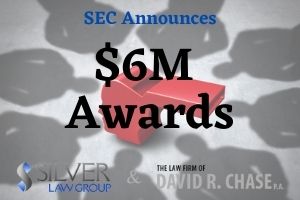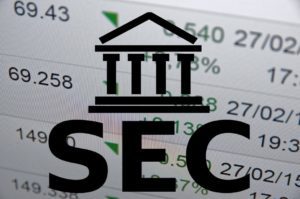 Before sitting down for her now-famous 60 Minutes interview, former Facebook employee Frances Haugen had filed eight complaints with the Securities and Exchange Commission (SEC). In these, she alleged that Facebook was misleading investors in how the company doesn’t act against hate crime, how it facilitates the spread of disinformation, how it harms young girls’ psychological wellbeing, and much more. Continue reading
Before sitting down for her now-famous 60 Minutes interview, former Facebook employee Frances Haugen had filed eight complaints with the Securities and Exchange Commission (SEC). In these, she alleged that Facebook was misleading investors in how the company doesn’t act against hate crime, how it facilitates the spread of disinformation, how it harms young girls’ psychological wellbeing, and much more. Continue reading
Articles Posted in Uncategorized
SEC Awards $6 Million To Five Joint Claimants
 The SEC has announced its latest whistleblower bounty of $6 million to five individuals in two groups for one single covered action.
The SEC has announced its latest whistleblower bounty of $6 million to five individuals in two groups for one single covered action.
The first group, known as “Claimant 1” in the order, provided crucial documents to the SEC that led to requests for additional documentation. These documents were the crux of the SEC’s case. The individuals continued to provide documentation and information to help SEC staff to understand the company’s business practices. Continue reading
Form U5 Defamation A Big Problem For Brokers
 After a broker or investment advisor leaves a FINRA member firm, a broker dealer is required to file a Form U5 with FINRA. This form details the broker’s termination. This is the case even if the broker voluntarily terminates his or her employment, or the individual is no longer working as a broker, but is still working for the firm in a different capacity. Continue reading
After a broker or investment advisor leaves a FINRA member firm, a broker dealer is required to file a Form U5 with FINRA. This form details the broker’s termination. This is the case even if the broker voluntarily terminates his or her employment, or the individual is no longer working as a broker, but is still working for the firm in a different capacity. Continue reading
Do SEC Whistleblowers Have A Moral Obligation?
 During the 2020 fiscal year, the Office of the Whistleblower reported close to 7,000 whistleblower tips. This number represents the largest number of tips received in the program’s ten-year history. Whistleblower claims can be made by ordinary people or those inside the corporate structure who suspect another has or is committing securities fraud. Continue reading
During the 2020 fiscal year, the Office of the Whistleblower reported close to 7,000 whistleblower tips. This number represents the largest number of tips received in the program’s ten-year history. Whistleblower claims can be made by ordinary people or those inside the corporate structure who suspect another has or is committing securities fraud. Continue reading
SEC Awards More Than $2.2 Million to Whistleblower Who Initially Reported Information to a Different Federal Agency
The Securities and Exchange Commission (the “SEC”) announced that it was awarding a whistleblower more than $2.2 million on April 5, 2018 using the “safe harbor” provision of the Securities Exchange Act of 1943.
The whistleblower, a former company insider, first reported the information to another federal agency and later provided the same information to the SEC. The information helped the SEC open an investigation that led to an enforcement action.
While not the highest amount awarded to a whistleblower by the SEC, the award is significant as it is the first award paid under the “safe harbor” of The Securities Exchange Act of 1934 Rule 21F-4(b)(7). The rule treats whistleblower information as though it had been submitted to the SEC at the same time that it was submitted to another federal agency as long as that same whistleblower information was submitted to the SEC within 120 days of first filing.
CFTC Website Launches News Portal for Whistleblower Program
The CFTC Whistleblower program today announced the launch of a news portal, event schedule, and FAQ for its whistleblower program on its website
This new portal will contain industry news, CFTC Events and a FAQ covering the Whistleblower program and information on submitting a whistleblower tip and claiming awards based on accurate tips. The CFTC hopes this newly created section of its site will provide higher quality tips that lead to larger sanctions and more awards being paid out to tipsters.
Some of the tips for Whistleblowers suggested by the CFTC
SEC Awards Approximately $1 Million to Whistleblower
The Securities and Exchange Commission (the “SEC’) announced on December 9, 2016 that it had awarded more than $900,000 to a whistleblower whose tip enabled the SEC to bring multiple enforcement actions against bad actors.
The nearly-$1 million award is the second award announced by the SEC this week and brings the total amount awarded to whistleblowers to more than $136 million. The $136 million plus has been awarded to 37 whistleblowers.
Under the SEC whistleblower program, established by the Dodd-Frank Act in 2011, the SEC is required to ardently protect confidentiality of whistleblowers and cannot disclose information that might indirectly or directly reveal a whistleblower’s identity.
SEC Awards $20 Million to Whistleblower
The sound of a whistle on Wall Street blew loudly this week for one informative whistleblower. What did that whistle sound like? It sounded like $20 million.
On November 14, 2016, the Securities and Exchange Commission (“SEC”) announced an award of more than $20 million to a whistleblower who gave valuable information that enabled the SEC to initiate an enforcement action against wrongdoers before the wrongdoers squandered the money. The $20 million award is the third-highest since the SEC’s whistleblower program issued its first award in 2012.
Under the SEC whistleblower rules, the SEC protects the confidentiality of whistleblowers and does not disclose information that might directly or indirectly reveal a whistleblower’s identity. This is why the details in almost all news releases regarding a whistleblower award are sparse. Even the SEC order determining the whistleblower claim is largely redacted. Other whistleblower orders follow suit.
Insider Whistleblowers in the Financial Advice Sector Set to Increase
Insiders in the investment advice sector are starting to grow bolder and start a trend of notifying the SEC of bad-acting firms and principals.
On August 30, 2016, the Securities and Exchange Commission announced another whistleblower award in the amount of more than $22 million. The amount is the second-largest total the SEC has awarded a whistleblower. The whistleblower’s detailed tip and extensive assistance helped the SEC halt a “well-hidden” fraud at the company where the whistleblower worked, according to the SEC.
Earlier this month, Indiana announced its first whistleblower award, giving $95,000 to a former JP Morgan official who helped the state’s regulator make an advice-related case against the firm that resulted in a $950,000 settlement.
How Attorney Contingency Fees Work for Whistleblowers
Litigating a case can take a long time and accrues many costs and fees. Among those fees include filing costs, the cost of hiring an expert to testify, the cost of various office tasks such as printing and mailing, and many others. But the first cost that immediately comes to most people’s minds is attorney’s fees.
Often times, the costs of paying an attorney might dissuade people from getting one in the first place or bowing to financial pressure in the midst of case simply because the client does not have enough money to continue paying an attorney. Paying thousands of dollars to an attorney without having absolute certainty a client will win his or her case can be a daunting endeavor.
The contingency fee presents a solution to all those upfront costs.
 SEC Whistleblower Lawyer Blog
SEC Whistleblower Lawyer Blog

